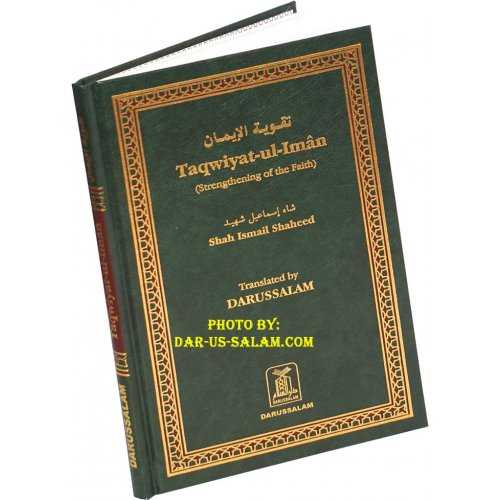What is The True Meaning of “Laa ilaaha illAllaah” and It’s Explanation from the Qur’an
What is The True Meaning of “Laa ilaaha illAllaah”? And Can We Find It’s Explanation from the Qur’an?
–by Shaykh Fawzan | Dawud Burbank [Audio|En]
Imaam Muhammad ibn ‘Abdul-Wahhaab (rahimahullaah) said:
ومعناها لا معبودَ بحقٍّ إلا اللهُ وحده؛ (لا إله) نافيًا جميعَ مَا يُعْبدُ مِنْ دونِ اللهِ (إلا الله) مُثْبِتًا العبادةَ له وحدَهُ لا شريكَ لهُ في عبادتِهِ، كما أنَّه ليس له شريك في مُلْكِه
And its meaning is none has the right to be worshipped except Allaah; laa ilaaha (nothing has the right to be worshipped) is a negation of everything which is worshipped besides Allaah. Illallaah (except Allaah) affirms worship for Allaah Alone, and that none is given any share of worship along with Him, just as He has no sharer in His Sovereignty.34
Related: Aqeedah (Belief)
[34]: Shaykh Saalih al-Fawzan’s Explanation:
His saying, “And its meaning is none has the right to be worshipped except Allaah”: the meaning of laa ilaaha illAllaah is not as is said by the people of falsehood: “there is no creator and there is no provider except Allaah”, because this is tawheed-ur-Ruboobiyyah (tawheed of Lordship), the people of shirk agreed to that, but they would not say laa ilaaha illAllaah. He the Most High said:
إِنَّهُمْ كَانُوا إِذَا قِيلَ لَهُمْ لَا إِلَٰهَ إِلَّا اللَّهُ يَسْتَكْبِرُونَ
وَيَقُولُونَ أَئِنَّا لَتَارِكُو آلِهَتِنَا لِشَاعِرٍ مَّجْنُونٍ
When it was said to them, “laa ilaaha illAllaah” (none has the right to be worshiped but Allaah), they became proud, and they say, “are we to abandon worshipping our gods for a crazy poet?” [37:35-36]
“Aalihatinaa” means: those things which we worship.
لِشَاعِرٍ مَّجْنُونٍ ..
… in favor of a crazy poet?” [37:35-36]
They meant the Messenger sallallaahu ‘alaihi wa sallam, they described him with poetry and madness, because he had said to them, “Say: laa ilaaha illAllaah”, and he forbade them from the worship of idols.
And when he said to them, “Say: laa ilaaha illAllaah”, they said:
أَجَعَلَ الْآلِهَةَ إِلَٰهًا وَاحِدًا ۖ إِنَّ هَٰذَا لَشَيْءٌ عُجَابٌ
Has he made all of the objects of worship a single One to be worshiped? This is something very strange [38:5]
They thought that there were many gods to be worshiped.
So therefore this shows that its meaning is – nothing truly deserves worship except Allaah. Whereas if its meaning were – there is no creator and there is provider except Allaah – then they agreed to that, and they did not question it. So if that were its meaning they would not have refused to say laa ilaaha illAllaah, because they used to say when they were asked, “Who created the heavens and the earth?”, they used to say, “Allaah”. And when they were asked, “Who creates? Who gives provision? Who gives life and gives death and who controls the earth?”, they used to say , “Allaah”. They acknowledged this. So if that were the meaning of laa ilaaha illAllaah then they would have consented to it. However its meaning is, “None has the right to be worshiped except Allaah”.
If you were to say, “Nothing is worshiped except Allaah”, this would be a great error, because then all the objects of worship would be Allaah, High and Exalted is Allaah above this. Rather if you restrict it and you say, “bihaqq” (nothing is deservedly worshiped), then all the objects of worship are negated except Allaah the Perfect and Most High. You must therefore say, None has the right to be worshiped truly, meaning none has the right to be worshiped except Allaah. Then he explained that in accordance with the wording of the saying:
laa ilaaha: is a negation, it negates the right to worship from everything besides Allaah.
illAllaah: this is affirmation of worship for Allaah alone with no partner.
So laa ilaaha illAllaah includes negation and affirmation, and tawheed has to have negation and affirmation both. Affirmation alone will not suffice; and negation would not suffice on its own. There must be negation and affirmation, just as He the Most High said:
فَمَن يَكْفُرْ بِالطَّاغُوتِ وَيُؤْمِن بِاللَّهِ
So whoever rejects the false objects of worship, and truly believes in and worships Allaah [2:256]
وَاعْبُدُوا اللَّهَ وَلَا تُشْرِكُوا بِهِ شَيْئًا
And worship Allaah and do not associate anything in worship along with Him [4:36]
So if you say, “Allaah is One who deserves worship”, this will not suffice, because Al-Laat is one who was worshiped, and Al-‘Uzza is one who was worshiped, and Manaat was an object of worship, all of the idols were called gods, or objects of worship. So therefore you must say, “laa ilaaha illAllaah”, none has the right to be worshiped except Allaah – there must be combination between negation and affirmation so that therefore tawheed is actualized and shirk is negated.
Imaam Muhammad ibn ‘Abdul-Wahhaab (rahimahullaah) said:
: وتفسيرها الذي يوضحها قوله تعالى
And its explanation which will make it clear is His saying, He the Most High:
وَإِذْ قَالَ إِبْرَاهِيمُ لِأَبِيهِ وَقَوْمِهِ إِنَّنِي بَرَاءٌ مِّمَّا تَعْبُدُونَ
إِلَّا الَّذِي فَطَرَنِي فَإِنَّهُ سَيَهْدِينِ
وَجَعَلَهَا كَلِمَةً بَاقِيَةً فِي عَقِبِهِ لَعَلَّهُمْ يَرْجِعُونَ
And remember when Ibraaheem said to his father and to his people “I am totally free of everything that you worship except for the One who created me, for He will guide me”. And Allaah made it a saying to persist amongst his progeny so that they might remember and return to obedience to their Lord. [43:26-28] 35
[35] Shaykh Saalih al-Fawzan’s Explanation:
The best thing to explain the Qur’aan is the Qur’aan. So laa ilaaha illAllaah has been explained by Allaah in the Qur’aan, and that is in the saying of His Khaleel, His specially chosen One (Ibraheem ‘alaihisalaatu wassalaam), in that which Allaah mentioned from him:
إِنَّنِي بَرَاءٌ
I am totally free [43:26]
This is negation; it has the same meaning of laa ilaaha (none has the right to be worshiped):
إِلَّا الَّذِي فَطَرَنِي
Except for the One who created me [43:27]
Meaning: except for Allaah. This is affirmation.
So this aayah is a complete and full explanation of the meaning of laa ilaaha illAllaah.
Imaam Muhammad ibn ‘Abdul-Wahhaab (rahimahullaah) said:
And His saying, He the Most High:
قُلْ يَا أَهْلَ الْكِتَابِ تَعَالَوْا إِلَىٰ كَلِمَةٍ سَوَاءٍ بَيْنَنَا وَبَيْنَكُمْ أَلَّا نَعْبُدَ إِلَّا اللَّهَ وَلَا نُشْرِكَ بِهِ شَيْئًا وَلَا يَتَّخِذَ بَعْضُنَا بَعْضًا أَرْبَابًا مِّن دُونِ اللَّهِ ۚ فَإِن تَوَلَّوْا فَقُولُوا اشْهَدُوا بِأَنَّا مُسْلِمُونَ
Say : O people of the Scripture, come to a word of justice between us that we will single out Allaah with all worship and will not worship anything else besides Him, nor will we take one another as lords besides Allaah. Then if they turn away then say bear witness that we are Muslims submitting to Allaah and making our worship purely and sincerely for him. [3:64]36
[36] Shaykh Saalih al-Fawzan’s Explanation:
And His saying, He the Most High:
قُلْ يَا أَهْلَ الْكِتَابِ تَعَالَوْا إِلَىٰ كَلِمَةٍ سَوَاءٍ بَيْنَنَا وَبَيْنَكُمْ أَلَّا نَعْبُدَ إِلَّا اللَّهَ وَلَا نُشْرِكَ بِهِ شَيْئًا
Say: O people of the Scripture, come to a word of justice between us that we will single out Allaah with all worship and will not worship anything else besides Him. [3:64]
This aayah from Soorah Aal-i-‘Imraan came down with regard to the deputation of Najraan, the Christians who came to the Prophet sallallaahu ‘alaihi wa sallam and debated him and asked him questions, and a long conversation occurred between them and him. They were Christians from the Christians of the Arabs. And in the end, the Prophet sallallaahu ‘alaihi wa sallam requested from them Al-Mubaahala (calling down Allaah’s curses upon whoever was lying):
فَقُلْ تَعَالَوْا نَدْعُ أَبْنَاءَنَا وَأَبْنَاءَكُمْ وَنِسَاءَنَا وَنِسَاءَكُمْ وَأَنفُسَنَا وَأَنفُسَكُمْ ثُمَّ نَبْتَهِلْ فَنَجْعَل لَّعْنَتَ اللَّهِ عَلَى الْكَاذِبِينَ
Then say: Come, let us call our children and your children, our womenfolk and your womenfolk, ourselves and yourselves – then let us invoke and call down Allaah’s Curse upon the liars. [3:61]
So when he requested al-Mubaahalah (calling down curses upon the liars), they feared and they did not engage in calling down the curses along with him, ‘alaihisalaatu wassalaam. Rather, they handed over the Jizyah because they knew that they were upon falsehood, and that he was the Messenger of Allaah, sallallaahu ‘alaihi wa sallam.
نبتهل: Meaning, let us call the curse down upon the liar from us. They knew that they were the ones who were the liars, and if they had engaged in calling down curses, fire would have descended upon them and consumed them in their places. Therefore they said no, we won’t do so – rather, we will hand over the Jizyah (special tax) and we will not engage in calling Allaah’s curses down upon the liars. So the Prophet sallallaahu ‘alaihi wa sallam accepted the payment of Jizyah from them. And it had become clear to them that Allaah had indeed commanded him with what was contained in this aayah.
This aayah contains the meaning of laa ilaaha illAllaah (none has the right to be worshiped except Allaah). His saying:
أَلَّا نَعْبُدَ
That we will not worship [3:64]
This is a negation. And His saying:
إِلَّا اللَّهَ
Except Allaah. [3:62]
This is affirmation.
And this is the ‘Adl (justice) for which the heavens and the earth are established. So the heavens and the earth are established upon tawheed (singling out Allaah with all worship) and upon al-‘Adl. So we do not associate anything in worship along with Him, neither with the Messiah, whom they claim is a lord and whom they worship besides Allaah, nor anyone besides the Messiah, not even Muhammad ‘alaihisalaatu wassalaam, and not any one from the Prophets, not anyone from the righteous, nor anyone from the awliyaa (beloved servants of Allaah):
أَلَّا نَعْبُدَ إِلَّا اللَّهَ وَلَا نُشْرِكَ بِهِ شَيْئًا
That we will not worship except Allaah, and we will not associate anything at all with Him. [3:64]
وَلَا يَتَّخِذَ بَعْضُنَا بَعْضًا أَرْبَابًا مِّن دُونِ اللَّهِ
And we will not take one another as lords besides Allaah. [3:64]
Meaning: Just as you (i.e. the people of the Book) have taken the Rabbis and monks as lords besides Allaah the Most High:
اتَّخَذُوا أَحْبَارَهُمْ وَرُهْبَانَهُمْ أَرْبَابًا مِّن دُونِ اللَّهِ وَالْمَسِيحَ ابْنَ مَرْيَمَ وَمَا أُمِرُوا إِلَّا لِيَعْبُدُوا إِلَٰهًا وَاحِدًا
They took their rabbis and their monks as lords besides Allaah and (they) also (took as their Lord) the Messiah, son of Maryam, and they were not commanded except that they should worship a single God. [9:31]
The taking of rabbis and monks as lords besides Allaah is something which Allaah’s Messenger sallallaahu ‘alaihi wa sallam explained as being their obedience to them in declaring lawful that which Allaah has made forbidden and making forbidden that which Allaah had made lawful.[1] This is the meaning of their taking them as lords besides Allaah, since they used to declare lawful that which Allaah has made forbidden, and declare forbidden which Allaah has made lawful. So the people obeying them upon that is taking them as Lords. This is because the One who legislates for the people and declares things to be lawful and forbidden for the people is Allaah the Perfect and Most High.
فَإِن تَوَلَّوْا
So, if they turn away. [3:64]
Meaning: (They) do not accept the call to tawheed:
فَقُولُوا اشْهَدُوا بِأَنَّا مُسْلِمُونَ
Then say: Bear witness that we are Muslims (obedient to Allaah, worshiping Him alone). [3:64]
They call them to bear witness that they were muwahiduun (people of tawheed) and that they were kuffaar (unbelievers). So they made clear to them the falsity of what they were upon. And this aayah shows Al-Baraa’a (freeing oneself) from the religion of the people of shirk and it clearly states “(We) bear witness that we are Muslims.” This contains the obligation of clearly announcing the falsity of what the people of shirk are upon and not remaining silent about it, and of clearly announcing the falsity of shirk and of refuting its people.
In summary:
Laa ilaaha illAllaah (none has the right to be worshiped except Allaah) has two pillars, and they are:
- An-Nafee (negation) and
- Al-Ithbaat (affirmation).
So if it is said to you: What are the pillars of laa ilaaha illAllaah? Then say, negation and affirmation.
Its conditions are seven, and it (saying the shahadah) will not benefit except with these conditions; someone has written them in a line of poetry and said:
Knowledge, certainty, purity and sincerity and your being truthful
Along with love, compliance, and acceptance of them
1.Knowledge: Its opposite is ignorance, so the person who says Laa ilaaha illAllaah with his tongue, but is ignorant of its meaning, then laa ilaaha illAllaah will not benefit him.
2.Certainty: Such that he does not have any doubt. This is because some people may know its meaning, however, they have a doubt about it, so his knowledge is not correct. He must have certainty of laa ilaaha illAllaah and that it is true.
3.Purity and Sincerity: Its opposite is ash-Shirk. Some people say laa ilaaha illAllaah, but they do not abandon shirk as is presently the case today with the worshipers of the graves. Those people will not be benefited by (saying) laa ilaaha illAllaah because from its conditions is abandoning shirk.
4.Being truthful: Its opposite is falsehood and lying. This is because the munaafiquun say laa ilaaha illAllaah, but they are liars in their hearts; they do not believe its meaning. Allaah the Most High said:
إِذَا جَاءَكَ الْمُنَافِقُونَ قَالُوا نَشْهَدُ إِنَّكَ لَرَسُولُ اللَّهِ ۗ وَاللَّهُ يَعْلَمُ إِنَّكَ لَرَسُولُهُ وَاللَّهُ يَشْهَدُ إِنَّ الْمُنَافِقِينَ لَكَاذِبُونَ
اتَّخَذُوا أَيْمَانَهُمْ جُنَّةً
When the hypocrites come to you, they say: “We bear witness that you are the Messenger of Allaah indeed.” But Allaah knows that you are indeed His Messenger, and Allaah bears witness that the hypocrites are liars. They take their oaths as a shield to screen them. [63:1-2]
5.Love: That the person loves this saying and is an ally to its people. As for the person who does not love it or does not love its people, then it will not benefit him.
6.Compliance: It is the opposite of turning away from it and abandoning it, and it is complying with what it (this saying) indicates with regard to worshiping Allaah Alone and not associating anything with Him, and it is complying with His commands. Since you have acknowledged and have borne witness that none has the right to be worshiped except Allaah Alone, then it becomes binding upon you to comply with His rulings and His religion. As for your saying laa ilaaha illAllaah, and you do not comply with His legislations, then laa ilaaha illAllaah will not benefit you.
7.Acceptance: Acceptance which negates Ar-Rad (rejection) – such that you do not reject anything from the rights of laa ilaaha illAllaah and whatever it indicates. Rather, you accept everything which laa ilaaha illAllaah indicates and you accept it correctly.
And an eighth condition is added:
And the eighth is added; rejecting whatever things are
worshiped besides the One who is truly worshiped
Meaning: 8.Freeing oneself from shirk. So a person will not be a muwahid (a person of tawheed) until he frees himself from shirk.
وَإِذْ قَالَ إِبْرَاهِيمُ لِأَبِيهِ وَقَوْمِهِ إِنَّنِي بَرَاءٌ مِّمَّا تَعْبُدُونَ
And when Ibraaheem said to his father and his people: I am totally free of whatever you worship. [43:26]
These are the conditions of laa ilaaha illAllaah – eight conditions.
Footnotes:
[1] Refer to the hadeeth of ‘Alee ibn Haatim radiy Allaahu ‘anhu that was reported by At-Tirmidhee (3095). In it Allaah’s Messenger sallallaahu ‘alaihi wa sallam said:
“They did not used to directly worship them, but rather, when they (priests or monks) declared something lawful for them, they (the people) would then declare it lawful. And when they declared something forbidden for them, they would take it as being forbidden.”
[Shaikh Al-Albaanee rahimahullaah declared this hadeeth as hasan (good)].
—
Audio Lecture Segment:
Sharh-ul-Usool-ith-Thalaathah : Lesson 27 Part B & Lesson 28
Shaykh Saalih al-Fawzan | Dawud Burbank [Audio|English]
Share this, Baarakallaah Feekum: [“One who guides to something good has a reward similar to that of its doer” – Saheeh Muslim vol.3, no.4665] [This website protects the copyrights of the authors/publishers. The Content is posted on this website with implicit/explicit permission from content owners. If you find any copyright violations please inform the same. I ask you to fear Allah before you spread the rumors and false information]

Don’t forget to comment & share. Also please click our ads, they pay the bills. jazakallahu khayr.

- Mix and match loose fit abaya + Free Hijab

- Price: $37.99
- Flow with lace abaya + Free Hijab

- Price: $37.99
- Basic Wrap Style Hijab Stole
- Price: $12.99
- Basic Everyday Wear Hijab Stole
- Price: $12.99
- Floral Thread Embroidered Hijab Stole
- Price: $19.99
- Sunflower Thread Embroidered Hijab Stole
- Price: $19.99
- Basic Everyday Wear School Uniform Hijab
- Price: $12.00
- I Love My Hijab Hoodie Abaya dress
- Price: $37.99
- Two Piece Lace Embroidered Al-Amairah Hijab Stole
- Price: $19.99
- Khimar-Long Prayer Women'S Hijab
- Price: $19.99












